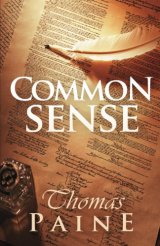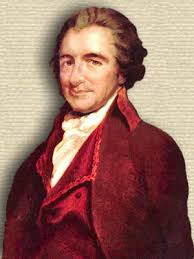Common Sense Page #17
Common Sense is a pamphlet written by Thomas Paine in 1775–1776 advocating independence from Great Britain to people in the Thirteen Colonies. Writing in clear and persuasive prose, Paine marshaled moral and political arguments to encourage common people in the Colonies to fight for egalitarian government.
As you have, without a proper authority for so doing, put yourselves in the place of the whole body of the Quakers, so, the writer of this, in order to be on an equal rank with yourselves, is under the necessity, of putting himself in the place of all those, who, approve the very writings and principles, against which your testimony is directed: And he hath chosen this singular situation, in order, that you might discover in him that presumption of character which you cannot see in yourselves. For neither he nor you can have any claim or title to Political Representation. When men have departed from the right way, it is no wonder that they stumble and fall. And it is evident from the manner in which ye have managed your testimony, that politics, (as a religious body of men) is not your proper Walk; for however well adapted it might appear to you, it is, nevertheless, a jumble of good and bad put unwisely together, and the conclusion drawn therefrom, both unnatural and unjust. The two first pages, (and the whole doth not make four) we give you credit for, and expect the same civility from you, because the love and desire of peace is not confined to Quakerism, it is the natural, as well the religious wish of all denominations of men. And on this ground, as men labouring to establish an Independant Constitution of our own, do we exceed all others in our hope, end, and aim. Our plan is peace for ever. We are tired of contention with Britain, and can see no real end to it but in a final separation. We act consistently, because for the sake of introducing an endless and uninterrupted peace, do we bear the evils and burthens of the present day. We are endeavoring, and will steadily continue to endeavour, to separate and dissolve a connexion which hath already filled our land with blood; and which, while the name of it remains, will be the fatal cause of future mischiefs to both countries. We fight neither for revenge nor conquest; neither from pride nor passion; we are not insulting the world with our fleets and armies, nor ravaging the globe for plunder. Beneath the shade of our own vines are we attacked; in our own houses, and on our own lands, is the violence committed against us. We view our enemies in the character of Highwaymen and Housebreakers, and having no defence for ourselves in the civil law, are obliged to punish them by the military one, and apply the sword, in the very case, where you have before now, applied the halter--Perhaps we feel for the ruined and insulted sufferers in all and every part of the continent, with a degree of tenderness which hath not yet made its way into some of your bosoms. But be ye sure that ye mistake not the cause and ground of your Testimony. Call not coldness of soul, religion; nor put the Bigot in the place of the Christian. O ye partial ministers of your own acknowledged principles. If the bearing arms be sinful, the first going to war must be more so, by all the difference between wilful attack and unavoidable defence. Wherefore, if ye really preach from conscience, and mean not to make a political hobby-horse of your religion, convince the world thereof, by proclaiming your doctrine to our enemies, for they likewise bear arms. Give us proof of your sincerity by publishing it at St. James's, to the commanders in chief at Boston, to the Admirals and Captains who are piratically ravaging our coasts, and to all the murdering miscreants who are acting in authority under him whom ye profess to serve. Had ye the honest soul of Barclay ¹ ye would preach repentance to your king; Ye would tell the Royal Wretch his sins, and warn him of eternal ruin. Ye would not spend your partial invectives against the injured and the insulted only, but, like faithful ministers, would cry aloud and spare none. Say not that ye are persecuted, neither endeavour to make us the authors of that reproach, which, ye are bringing upon yourselves; for we testify unto all men, that we do not complain against you because ye are Quakers, but because ye pretend to be and are not Quakers. ¹"Thou hast tasted of prosperity and adversity; thou knowest what it is to be banished thy native country, to be over-ruled as well as to rule, and set upon the throne; and being oppressed thou hast reason to know how hateful the oppressor is both to God and man: If after all these warnings and advertisements, thou dost not turn unto the Lord with all thy heart, but forget him who remembered thee in thy distress, and give up thyself to follow lust and vanity, surely great will be thy condemnation.--Against which snare, as well as the temptation of those who may or do feed thee, and prompt thee to evil, the most excellent and prevalent remedy will be, to apply thyself to that light of Christ which shineth in thy conscience, and which neither can, nor will flatter thee, nor suffer thee to be at ease in thy sins." --Barclay's address to Charles II. Alas! it seems by the particular tendency of some part of your testimony, and other parts of your conduct, as if, all sin was reduced to, and comprehended in, the act of bearing arms, and that by the people only. Ye appear to us, to have mistaken party for conscience; because, the general tenor of your actions wants uniformity: And it is exceedingly difficult to us to give credit to many of your pretended scruples; because, we see them made by the same men, who, in the very instant that they are exclaiming against the mammon of this world, are nevertheless, hunting after it with a step as steady as Time, and an appetite as keen as Death. The quotation which ye have made from Proverbs, in the third page of your testimony, that, "when a man's ways please the Lord, he maketh even his enemies to be at peace with him"; is very unwisely chosen on your part; because, it amounts to a proof, that the king's ways (whom ye are desirous of supporting) do not please the Lord, otherwise, his reign would be in peace. I now proceed to the latter part of your testimony, and that, for which all the foregoing seems only an introduction, viz. "It hath ever been our judgment and principle, since we were called to profess the light of Christ Jesus, manifested in our consciences unto this day, that the setting up and putting down kings and governments, is God's peculiar prerogative; for causes best known to himself: And that it is not our business to have any hand or contrivance therein; nor to be busy bodies above our station, much less to plot and contrive the ruin, or overturn of any of them, but to pray for the king, and safety of our nation, and good of all men: That we may live a peaceable and quiet life, in all godliness and honesty; under the government which God is pleased to set over us."- -If these are really your principles why do ye not abide by them? Why do ye not leave that, which ye call God's Work, to be managed by himself? These very principles instruct you to wait with patience and humility, for the event of all public measures, and to receive that event as the divine will towards you. Wherefore, what occasion is there for your political testimony if you fully believe what it contains: And the very publishing it proves, that either, ye do not believe what ye profess, or have not virtue enough to practise what ye believe.
Translation
Translate and read this book in other languages:
Select another language:
- - Select -
- 简体中文 (Chinese - Simplified)
- 繁體中文 (Chinese - Traditional)
- Español (Spanish)
- Esperanto (Esperanto)
- 日本語 (Japanese)
- Português (Portuguese)
- Deutsch (German)
- العربية (Arabic)
- Français (French)
- Русский (Russian)
- ಕನ್ನಡ (Kannada)
- 한국어 (Korean)
- עברית (Hebrew)
- Gaeilge (Irish)
- Українська (Ukrainian)
- اردو (Urdu)
- Magyar (Hungarian)
- मानक हिन्दी (Hindi)
- Indonesia (Indonesian)
- Italiano (Italian)
- தமிழ் (Tamil)
- Türkçe (Turkish)
- తెలుగు (Telugu)
- ภาษาไทย (Thai)
- Tiếng Việt (Vietnamese)
- Čeština (Czech)
- Polski (Polish)
- Bahasa Indonesia (Indonesian)
- Românește (Romanian)
- Nederlands (Dutch)
- Ελληνικά (Greek)
- Latinum (Latin)
- Svenska (Swedish)
- Dansk (Danish)
- Suomi (Finnish)
- فارسی (Persian)
- ייִדיש (Yiddish)
- հայերեն (Armenian)
- Norsk (Norwegian)
- English (English)
Citation
Use the citation below to add this book to your bibliography:
Style:MLAChicagoAPA
"Common Sense Books." Literature.com. STANDS4 LLC, 2024. Web. 26 Nov. 2024. <https://www.literature.com/book/common_sense_270>.




Discuss this Common Sense book with the community:
Report Comment
We're doing our best to make sure our content is useful, accurate and safe.
If by any chance you spot an inappropriate comment while navigating through our website please use this form to let us know, and we'll take care of it shortly.
Attachment
You need to be logged in to favorite.
Log In